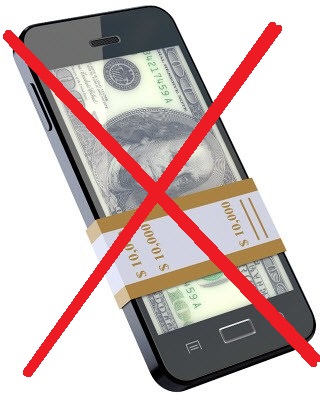Consumers continue to worry about the security issues associated with mobile commerce
Mobile commerce is growing in popularity, but this does not mean that new payment platforms are perfect. Over the past few years, consumers interested in mobile payments have expressed concern regarding security issues. Primarily, consumers are worried that their financial information is at risk of being exploited if they make use of a mobile payment service. This has been true in the past, as malicious groups have targeted such services and have gained access to sensitive information.
Some cash through Paym is going to the wrong accounts
NatWest, the United Kingdom’s largest retail and commercial bank, admits that mobile payments are not perfect. The bank’s own service, called Paym, is included in this, with the bank noting that, at times, money could be put into the wrong account due to a glitch. Before consumers can use Paym to make a purchase, they must funnel money into their accounts that are linked to the service. The glitch caused this money to be sent to accounts that were not linked to the service, much to the surprise of the owner of that bank account. NatWest is now working on fixing this problem in order to ensure that money goes where it is meant to.
Paym has become very popular among consumers
 Paym launched in April of 2014 and more than $150 million in payments have been sent through the service since that time. Approximately 40 million people use the service, making it one of the most popular services of its kind in the United Kingdom. Paym does not only work with NatWest accounts, of course, and those with accounts with Barclays, Lloyds Bank, and several other organizations can use the service.
Paym launched in April of 2014 and more than $150 million in payments have been sent through the service since that time. Approximately 40 million people use the service, making it one of the most popular services of its kind in the United Kingdom. Paym does not only work with NatWest accounts, of course, and those with accounts with Barclays, Lloyds Bank, and several other organizations can use the service.
Glitch highlights security concerns that exist in the mobile commerce space
The glitch suffered by Paym highlights ongoing concerns regarding the mobile commerce sector. Because new payment systems are electronic and, in many cases, automated, they are susceptible to faults in software. Glitches can lead to a major financial impact for consumers and businesses alike, which could result in liability issues for organizations responsible for these payment systems.
Many consumers are turning to their mobile devices to get their shopping and banking done
Mobile payments have become quite popular in South Korea. The country is home to one of the most expansive mobile Internet infrastructures in the world and many consumers have begun to exploit the Internet speeds they have access to in order to get their shopping done quickly. A new report from the Bank of Korea shows that consumers are beginning to favor their mobile devices when shopping online, largely due to the convenient nature of mobile commerce.
Bank of Korea report shows that one in six consumers turn to mobile payments
According to the report from the Bank of Korea, one in six South Korean consumers have made use of a mobile payments service. The report shows that most consumers make use of these services once to three times a month. Approximately 23% of consumers reported that they use mobile payments services at least once a month, with another 23% reporting that they use these services much more frequently; at least once or twice a week. With more consumers becoming involved in mobile commerce, many businesses may find new opportunities to effectively engage these potential customers.
Demand for secure and reliable services continues to rise in South Korea
 Bank of Korea suggests that organizations should improve their mobile banking operations in order to effectively engage consumers on smartphones. In improving these operations, organizations should focus on two aspects of the mobile commerce world: Security and reliability. The demand for reliable mobile payments services and new banking services is growing, creating opportunities for financial service instructions that may result in economic success. Organizations will also have to ensure that the services they offer are capable of adequately protecting consumer information.
Bank of Korea suggests that organizations should improve their mobile banking operations in order to effectively engage consumers on smartphones. In improving these operations, organizations should focus on two aspects of the mobile commerce world: Security and reliability. The demand for reliable mobile payments services and new banking services is growing, creating opportunities for financial service instructions that may result in economic success. Organizations will also have to ensure that the services they offer are capable of adequately protecting consumer information.
Security remains a priority for companies involved in mobile commerce
Security is, perhaps, the most important issue to address. Many consumers have avoided using mobile payments services because they worry that their information may be exposed to significant risks. Companies involved in the mobile payments space have been working to allay fears concerning security through the introduction of new technology. New services with more robust security features are becoming available as a result.
 Paym launched in April of 2014 and more than $150 million in payments have been sent through the service since that time. Approximately 40 million people use the service, making it one of the most popular services of its kind in the United Kingdom. Paym does not only work with NatWest accounts, of course, and those with accounts with Barclays, Lloyds Bank, and several other organizations can use the service.
Paym launched in April of 2014 and more than $150 million in payments have been sent through the service since that time. Approximately 40 million people use the service, making it one of the most popular services of its kind in the United Kingdom. Paym does not only work with NatWest accounts, of course, and those with accounts with Barclays, Lloyds Bank, and several other organizations can use the service.
 Bank of Korea suggests that organizations should improve their mobile banking operations in order to effectively engage consumers on smartphones. In improving these operations, organizations should focus on two aspects of the
Bank of Korea suggests that organizations should improve their mobile banking operations in order to effectively engage consumers on smartphones. In improving these operations, organizations should focus on two aspects of the 